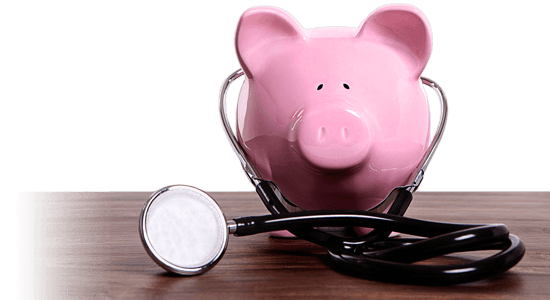Medical Debt Relief Services
Medical debt can be difficult to deal with, as an individual burdened by a large amount of medical bills didn’t become afflicted out of choice. Most illnesses and accidents occur unexpectedly, and for this reason, burdens associated with medical debt extend beyond the financial realm toward the physical and emotional. Indeed, an ever-expanding pile of medical debt might be the last thing that someone who is struggling with a potentially serious health problem wants to think about.
Even for a person with health insurance, a relatively brief hospital stay can lead to a shockingly high load of medical debt. For those facing a serious, chronic health problem, high levels of medical debt only compound the misery. In fact, just over half of the debt that appears on consumer credit reports nationally can be attributed to medical debt. Indeed, it should come as little surprise that medical debt remains one of the chief causes of consumer bankruptcy within the United States today.
Table Of Contents
- Benefits of Medical Debt Relief Services
- How Does It Work?
- Top Videos Related to Credit Card
- Manage Your Medical Debt
- What if I Don't Have Health Insurance?
- Medicaid Could be an Option to Pay for Medical Debt
- I Have Health Insurance, but…
- Medical Debt, Collections Agencies and Credit Score Impact
- Time is on Your Side with Medical Debt
- Get Help with Your Medial Debt from United Debt Settlement
- Education Center
Benefits of Medical Debt Relief Services
Reduce Your Debt
Shrink your debt and grow your savings with United Debt Settlement. We’re your partners in chipping away at those towering credit card balances.
Avoid Bankruptcy
Steer clear of bankruptcy’s shadow with proactive debt management. Our experts craft escape routes that protect your credit and your peace of mind.
Financial Freedom
Step into a life free from debt. Our tailored strategies are your blueprint to a future where your finances are yours to enjoy, not owe.
Top Videos Related to Credit Card
Medical Debt Help
Learn how to approach medical bills before it gets too late. Explore proven medical debt relief options with certified debt professionals.
Debt Management
Debt Management Plans (DMP) - A program managed by a credit counseling agency working on your behalf to negotiate lower interest rates & monthly payments with your creditors. Learn the pros & cons of debt management plans.
Debt Consolidation
Debt consolidation loans combine all credit card debts into one monthly payment. Decrease the chance of submitting late payments with a debt management plan.
Manage Your Medical Debt
Given the high cost of medical care, you must make every effort possible to responsibly pay off your medical expenses and manage your medical debt. Medical billing is complicated and mistakes do occur. When you receive a medical bill, make certain that it is 100% accurate. Examine the bill closely for any possible overcharges or billings for services that were not actually rendered. Follow up with your insurance company regarding charges that were not covered and get clear explanations as to why you are being held financially responsible for them. For those charges not covered, you can attempt to negotiate and work out a payment plan with your doctor or hospital.
Review your household budget beforehand to figure out which medical bills you can afford to pay on a timely basis each month. Contacting your medical provider when you are not immediately paying your medical bill off in full is always a good idea, as this informs the billing office that you are cognizant of the debt and not ignoring it. This is important because historically, medical providers typically have only attempted to collect on medical bills for a few short months before turning over delinquent accounts to collection agencies, thereby making things even more difficult while blemishing your credit profile.
However, there is some good news here. Beginning in September 2017, the three major credit reporting agencies (Experian, Equifax and TransUnion) have instituted a 180-day waiting period before including medical debt on credit reports in order to allow for sufficient time to resolve disputes with insurance companies and payment delays.


What if I Don't Have Health Insurance?
If the medical bill in question comes from your doctor, and you know your doctor reasonably well, try working out a payment plan. Alternatively, if you have an emergency fund set aside, inquire as to whether the office would accept a reduced settlement lump sum payment in cash. You can also offer to pay a similar amount to what your doctor accepts from major medical insurance companies for similar treatment.
If you’re dealing with a hospital bill, contact the billing office and have every charge fully explained to you. No detail on a hospital bill is too small – be fully thorough in your questioning, as this is the best way to guard against any potential medical billing errors and fraud. If you spot any expensive procedures listed on your hospital bill to which you don’t recall consenting, dispute them with the billing office.
Medicaid Could be an Option to Pay for Medical Debt
Medicaid is a government funded health program provided to low-income individuals and families who can’t afford medical care expenses. If you’re struggling with recent medical bills, contact your state Medicaid office to determine whether you qualify. If you qualify, Medicaid could cover expenses ranging back from up to ninety days prior to your actual application for Medicaid assistance. Additionally, depending on the state in which you live, some hospitals are required to offer discounts to the uninsured, regardless of income levels.


I Have Health Insurance, but…
Even people who have health insurance can get blindsided by medical bills that lead to a high level of medical debt. If you’ve been billed by your medical provider but believe that some of the charges should actually be covered, refer back to your policy explanation of benefits and call your insurance company to discuss the matter.
If it becomes clear that your doctor or hospital should be paid by your insurance company, quickly file an appeal. Many insurers will limit the time to filing an appeal for medical bills to sixty days, so don’t procrastinate. The appeals process can be lengthy and riddled with delays, so try to be patient. You should also keep written records of your phone calls and be prepared to refer back to emails in the event you need to subsequently file a formal complaint with your State Insurance Commission…
Medical Debt, Collections Agencies and Credit Score Impact
Medical providers typically do not report delinquent medical debt directly to Experian, Equifax and TransUnion. Instead, they send unpaid debts to collection agencies, who then report the debt to the credit bureaus. With the new 180-day waiting period, things have gotten better for debtors. Furthermore, with the recently instituted FICO Score9 scoring model, when a medical debt gets fully paid off, even after having been placed in collections, it is completely removed from a credit profile.
However, there is an important distinction of which you need to be aware – if the original medical provider reported the debt as delinquent or “late” to any of the credit bureaus before sending the account to collections, that negative impact to your credit score will not be undone – despite the bill being paid in full subsequent to it being placed in collections. Therefore, it is important to reference copies of your credit report to see whether any original medical creditors reported any late payments as such before handing them over to collections. Those blemishes from medical debts will remain on your credit report for seven years, regardless of whether you pay the full debt off.
Accordingly, the age of the medical debt also matters. For example, it may make little sense to actually pay off old medical debts that have been in collection – even if they never were reported by the original creditors – because if those seven years are almost up, the stain will soon be removed by the passage of time. However, consider this option only if the statute of limitations in your state is not longer than seven years, otherwise you could be held legally responsible for the debt in the event a lawsuit is brought against you.

Time is on Your Side with Medical Debt
There is now a 180-day waiting period before medical debt can be turned over to collections agencies, and this plays in your favor. Use the time to carefully dispute any questionable medical charges with your medical providers and insurance company. Try to negotiate installment payments wherever possible and consult with a skilled professional debt settlement firm who can help negotiate further with creditors and work out a reduced payoff amount.
In the majority of circumstances, paying off a settlement-reduced medical debt will result in the removal of the negative mark of collections activity from a credit profile. Remember, if you’re facing significant medical debt that results from an unforeseen illness or accident, there is always a way to solve the problem. If you keep calm and follow some of the steps outlined here, you can look forward to the full restoration of your physical, emotional and financial well-being.
Get Help with Your Medial Debt from United Debt Settlement
If you can’t afford to pay your medical debt, debt settlement may be a viable option for you. Just as in the case with delinquent credit card debt, creditors may be willing to accept a lower pay-off balance on an account that looks like it could turn into a non-recoverable asset for them. A skilled and reputable credit counseling agency or debt settlement firm can help you navigate these waters by effectively negotiating with creditors. Ideally, you should initiate the settlement process as early as possible, prior to your medical provider turning your account over to a collections agency who will have significantly less incentive to settle than a doctor or hospital billing office.
The good news here is that once your medical debt settlement is paid, there will be no detrimental impact to your credit score. Be aware that any settlement savings exceeding $600 are treated as ordinary income by the IRS. If medical debt settlement isn’t feasible for you, alternatives include pursuing a medical debt consolidation loan, personal bank loan, home equity loan or line of credit, or as a last resort – paying your medical debt off with a credit card.
United Settlement provides experience and proven results with medical debt help. Work with our skilled and reputable IAPDA approved agents to learn more about medical debt relief. Call us at 888-574-5454 or email [email protected] with any inquiries. Apply now to see what you can save.
Education Center

Credit Cards And Your Credit
Medical Debt FAQ
Medical debt does not affect a credit score and profile unless it is reported to a credit bureau. It is not common for a hospital or medical provider to report medical debt directly to a credit bureau, although a delinquent account can be turned over to a collections agency that can report the debt to the three major credit bureaus, thereby impacting a credit score and profile.
Medical debt inheritance laws vary widely from state to state. In many states, unpaid medical debts become the responsibility of the estate of the deceased, so although children will not be held responsible, their inheritance can be impacted if assets from the estate are required to pay off medical debts. However, many states also require children to pay some part of a parent’s unpaid medical debt if there are insufficient funds within the estate.
Medical providers won’t typically report delinquent accounts to the three major credit bureaus (Experian, Equifax and TransUnion), but they will often send them to outside collection agencies who will then often report them. Collection accounts harm credit scores whether they are unpaid or paid, though the newer FICO 9 scoring model does treat paid medical collections more favorably than unpaid medical collections. However, many creditors still use older models when determining creditworthiness, so once medical debt reaches collections, it often creates a stain that remains under federal law for seven years and 180 days from the date the consumer first went delinquent on the original debt, regardless of whether the account has been eventually settled or paid in full. However, there are some collection agencies that are more flexible and open to deleting negative information from credit reports after a debt has been satisfied. Be certain to get written confirmation of any such eventual deletion prior to making payment to the collection agency.
The key with settling medical debt is to keep your account out of collections. Remember, most hospitals and medical providers will not report delinquent accounts to the three major credit bureaus (Equifax, Experian, and TransUnion). However, once a medical provider turns an account over to collections, all bets are off and credit bureaus are often contacted. Therefore, when negotiating directly with a representative of a hospital billing office, make certain to get any payment plans expressed in writing. This way, if you do successfully negotiate an interest-free, low monthly payment arrangement over a period of up to two years, making your required monthly payments will keep your medical debt out of collections. When a negotiated payment plan is not made explicit in writing, or when a medical debtor is even just a few days late on an agreed upon scheduled payment, it is possible for the debt to be quickly sent to collections.
When negotiating directly with a representative of a hospital billing office, make certain to get any payment plans expressed in writing. This way, if you do successfully negotiate an interest-free, low monthly payment arrangement over a period of up to two years, making your required monthly payments will keep your medical debt out of collections. Always request an itemized bill and check for errors, and consult with your insurance carrier to gain a full understanding of what was and was not covered prior to beginning negotiation. You can offer to pay in full upfront for a discount, or pursue an interest-free payment plan.
